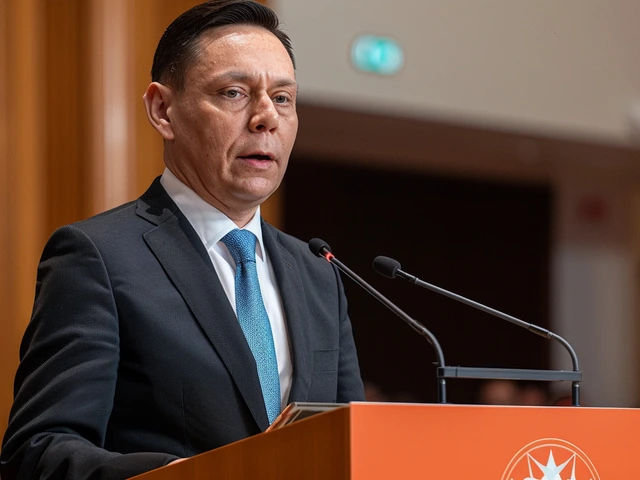When Aliko Dangote, Chairman of Dangote Group visited President Bola Ahmed Tinubu in Abuja last week, he hailed the administration’s sweeping oil sector reforms.
The meeting, held on 15 May 2025 at the Presidential Villa, centered on recent changes at the Nigerian National Petroleum Corporation Limited (NNPC). Dangote praised the appointment of Bashir Ojulari as Group Chief Executive Officer, calling it a "revolutionary shift" that could finally break the log‑jam that has hamstrung Nigeria’s energy ambitions for years.
Background: Tinubu’s Oil‑Sector Overhaul
Since taking office in May 2023, President Tinubu has pushed a series of structural adjustments aimed at boosting transparency and attracting foreign investment. The core of the plan includes revamping NNPC’s governance, tightening oversight of downstream marketers, and renegotiating joint‑venture contracts with multinational oil firms.
Analysts note that the reforms mirror a broader “Nigeria First” narrative, where the government seeks to turn the country’s oil wealth into a sustainable development engine rather than a source of patronage.
Dangote’s Clarifications and New Leadership Praise
During the media briefing that followed the presidential meeting, Dangote fielded questions about a prior comment in which he said he was “still fighting for the survival of my $20 billion refinery.” He clarified that the fight was aimed at entrenched oil marketers and traders – the so‑called “cabals” that have historically obstructed policy implementation – not at the fresh NNPC leadership.
"The new team at NNPC has been nothing short of supportive," he said. "Their focus on transparency and accountability aligns perfectly with what we need for the refinery to operate at full capacity."
PENGASSAN Standoff and Presidential Intervention
In a separate episode on 6 October 2025, the Petroleum and Natural Gas Senior Staff Association of Nigeria (PENGASSAN) threatened industrial action that could have crippled Dangote’s refining operations. The union cited grievances over wage adjustments and safety standards.
President Tinubu, through his Minister of Petroleum Resources, stepped in and brokered an agreement that averted what Dangote described as “potential sabotage.” The refinery issued a statement thanking the president for “restoring order at a critical moment,” underscoring the administration’s willingness to intervene decisively when sector stability is at stake.
Early Impact: Rigs, Production Targets and Market Signals
Data from the Organisation of the Petroleum Exporting Countries (OPEC) shows a striking uptick in Nigeria’s drilling activity. The country operated 15 rigs in August 2025, up from just nine in May 2025 – a 66 % increase in less than four months.
Under Ojulari’s stewardship, NNPC has set an ambitious target of reaching 1.8 million barrels of oil per day by the end of 2025, a significant hike from the 1.3 million barrels recorded at the start of the year. If achieved, the output boost could add roughly $12 billion in export revenues, reshaping the nation’s balance of payments.
Industry observers say the surge in rig count reflects renewed confidence among local and international service companies, many of whom have cited clearer licensing procedures and faster permit approvals as key incentives.
Expert Views and Future Outlook
Energy economist Dr. Amina Yusuf of the University of Lagos warns that while the reforms are promising, “sustaining this momentum will require consistent policy enforcement and protection of investors from political volatility.”
Meanwhile, the International Energy Agency (IEA) notes that Nigeria’s projected production climb could help the OPEC+ group meet its collective output commitments, easing price pressures in global markets.
For the Dangote Group, the outlook appears optimistic. The refinery’s management says the plant is on track to achieve 650,000 metric tonnes of refined products per month by the third quarter of 2025, a capacity that could dramatically reduce the nation’s reliance on imported gasoline.
All eyes are now on the upcoming November 2025 review of NNPC’s performance, where Tinubu’s administration will likely gauge whether the new leadership can meet the production milestones and maintain the improved governance standards.
Frequently Asked Questions
How do the oil‑sector reforms affect local businesses?
The reforms streamline licensing and reduce bureaucratic delays, allowing local service firms to secure contracts faster. Since May 2025, at least 12 Nigerian drilling companies have reported a 30 % reduction in permit processing time, boosting their competitiveness against foreign firms.
What was the role of President Tinubu in the PENGASSAN dispute?
Tinubu’s office acted as a mediator, convening senior officials from the Ministry of Petroleum Resources and representatives of Dangote Refinery. The intervention led to a settlement on wage adjustments and safety commitments, preventing a shutdown that could have halted up to 200,000 barrels of daily output.
Why did Dangote emphasize the new NNPC leadership?
Dangote highlighted the leadership change because Bashir Ojulari’s team has already shown support for the refinery’s feedstock needs, facilitating smoother supply contracts. This backing is crucial for the $20 billion plant to meet its planned production levels.
What are the projected oil‑production numbers for 2025?
NNPC aims to lift output to 1.8 million barrels per day by December 2025, up from roughly 1.3 million barrels in January. If achieved, the increase would represent a 38 % rise year‑over‑year, adding an estimated $12 billion in export earnings.
What challenges could jeopardize these reforms?
Experts warn that lingering corruption, fluctuating global oil prices, and potential political shifts ahead of the 2027 elections could undermine progress. Consistent enforcement of new policies will be essential to maintain investor confidence.






Neha Shetty
October 7, 2025 AT 02:42It's encouraging to see Dangote acknowledging the new NNPC leadership. The reforms could finally untangle the bureaucratic knots that have slowed down refinery feedstock. Transparency and accountability are the right vibes for attracting investment. If the government keeps this momentum, the oil sector might see sustainable growth. Let's hope the ambitious production targets are realistic.
Apu Mistry
October 12, 2025 AT 21:35i think the whole thing is a bit overhyped i mean the new boss could be a game changer but we all know politics can be messy. dangote was just doing the PR round anyway. still, any sign of change is welcome though… maybe.
Rajnish Swaroop Azad
October 18, 2025 AT 16:29Dangote shouting about reforms feels like a drama scene. New NNPC team, new hope.
bhavna bhedi
October 24, 2025 AT 11:22The optimism is palpable yet the formal tone seems misplaced it feels like a celebration of a new chapter. We see the numbers climbing and the rigs on the rise, which is great. Still, let’s keep an eye on the real impact on the ground.
jyoti igobymyfirstname
October 30, 2025 AT 05:15Wow! The whole oil scene is turning into a blockbuster episode. Dangote’s praise is like a plot twist that we didn’t see coming. Hope the script stays positive.
Vishal Kumar Vaswani
November 5, 2025 AT 00:09Everything sounds perfect until you remember who pulls the strings behind the curtains 😏. The reforms could be a smokescreen for deeper agendas. Still, the emojis say it all – confidence is high! Let’s watch the data, not just the headlines.
Zoya Malik
November 10, 2025 AT 19:02I appreciate the detailed breakdown of the reforms, but I remain cautious. The past shows that promises often stall when real money is at stake. If the new leadership can truly enforce transparency, the sector could finally breathe. Otherwise, it’s just another cycle of hope and disappointment. Time will be the judge.
Ashutosh Kumar
November 16, 2025 AT 13:55Let’s not kid ourselves – the stakes are huge and the drama even bigger. The reforms must survive the next political storm.
Gurjeet Chhabra
November 22, 2025 AT 08:49The increase in rig count is a clear sign that companies trust the new policies. More rigs mean more oil, which means more jobs for locals. Simple as that.
AMRESH KUMAR
November 28, 2025 AT 03:42Finally some good news! 🙌
ritesh kumar
December 3, 2025 AT 22:35While the headline numbers look promising, we must dissect the underlying mechanisms. The legislative framework must be insulated from parliamentary turnover, otherwise the gains are transient. Moreover, the supply chain logistics will need robust digital integration to avoid bottlenecks. Stakeholder alignment, especially with multinational partners, is a non‑negotiable factor. In short, the reforms are only as strong as their implementation fidelity.
Raja Rajan
December 9, 2025 AT 17:29The data on production targets is impressive, but we should verify the sources. Consistency in reporting will build investor confidence. Let’s monitor quarterly updates.
Atish Gupta
December 15, 2025 AT 12:22From an economic perspective, scaling up to 1.8 million barrels per day could reshape Nigeria’s fiscal landscape. However, the infrastructure lag could become a choke point. We need to watch the downstream capacity upgrades closely. Additionally, the regulatory environment must remain stable to avoid capital flight. The world will be watching how these policies translate into real output.
Aanchal Talwar
December 21, 2025 AT 07:15Great breakdown, really helps put things in perspective. The collaboration between government and private sector looks promising. Let’s keep the conversation going.
Ananth Mohan
December 27, 2025 AT 02:09Thanks for the kind words. It’s essential that we all stay informed and support constructive dialogue. The reforms are a collective effort, and every stakeholder has a role. Monitoring progress objectively will ensure we celebrate real achievements. Keep sharing insights as they emerge.
Abhishek Agrawal
January 1, 2026 AT 21:02While many have hailed the recent NNPC leadership change as a panacea for Nigeria’s oil woes, one must approach such proclamations with a healthy dose of skepticism. First, the historical pattern of reform fatigue suggests that without institutional safeguards, even the most well‑intentioned leadership can quickly become subsumed by entrenched interests; the ‘revolutionary shift’ may merely repaint familiar bureaucratic inefficiencies with fresh branding. Second, the announced production target of 1.8 million barrels per day, though ambitious, lacks a transparent, step‑by‑step roadmap-what specific capital allocations, technology transfers, and manpower training initiatives are slated to bridge the current 500,000‑barrel gap? Third, the surge in rig count, while statistically notable, does not inherently translate to net output gains; the fact that many rigs are operating under short‑term contracts raises questions about the sustainability of the uplift. Moreover, the recent PENGASSAN episode underscores the volatile labor dynamics that could derail operational continuity if not institutionalized through robust collective bargaining frameworks. Finally, the macro‑economic implications-particularly the interplay between oil revenue volatility and fiscal policy-require rigorous hedging strategies to prevent a resurgence of the classic resource‑curse scenario. In sum, while the overt optimism is refreshing, the underlying complexities demand rigorous scrutiny, continuous stakeholder engagement, and, most crucially, unwavering political will to transform rhetoric into enduring, measurable progress.